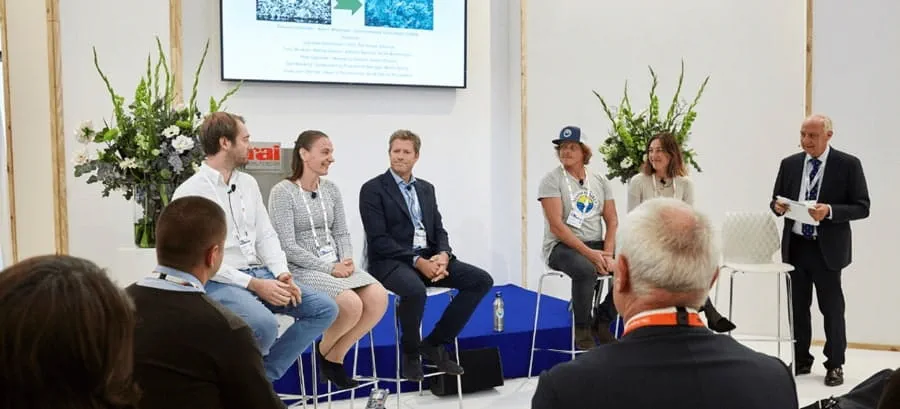This year at the I-nnovationLab stage an expert panel discussion, moderated by Albert Willemsen, explored how marinas, yacht clubs, sailing organisations and creative individual projects are contributing to environmental sustainability and ocean conservation. In this blog we share the five key points from the expert panel discussion 'Towards Cleaner, Healthier Oceans and Waterways'
Protect oceans against fishing or development
Protecting oceans with established marine reserves has now grown to a total surface area of 6%, from 2.5% only a few years ago, with the help of organisations like BLUE Marine Foundation. Scientific support for a target of 30% by the year 2030 has created an ambitious new target.
BLUE have engaged the leisure marine community in getting behind them and supporting their mission, both practically and financially. Examples are the BLUE Marine Yacht Club, set up in 2012 which established a Clean Ocean Charter supported across all sectors of the superyacht community. Also, the annual London to Monaco sponsored bike ride, which has raised over 1 million pounds towards ocean conservation projects over a three-year period, and has been supported by over 200 riders, many of them from the yachting community.
Reduce ocean plastic pollution by 90%
The Ocean Cleanup has a mission to reduce ocean plastic pollution by 90% by the year 2040. There are 5 gyres in the world where the plastic gathers, with the most polluted of all being the North Pacific gyre, which is why their first cleanup system is now positioned there.
In the coming months, the Ocean Cleanup team will be studying and reporting on how such a large collection array behaves in mid ocean tides and winds, how to minimise its effects on marine life and navigational safety, also researching and reporting on types and volumes of plastic being collected during the startup phase.
Execution of the Sustainability 2030
World Sailing members spent two days brain storming all the possible issues that can affect sustainability in the sailing community. This was followed by a 3-month consultation process which received feedback from 75 countries. The end result was 56 clearly defined targets, going as far as dealing with the increasing threat to marine biodiversity from invasive species.
Execution of the Sustainability 2030 agenda has already started. For instance, one regatta event has been staged with no singe use plastics being involved at all. And the Volvo Ocean race, which reaches just about every corner of the world’s oceans, has delivered important open source data on plastic pollution levels, generated from analytic apparatus installed on two of the competing yachts.
Cleaning up the sea bed from over a century of shipyard debris
Porto Montenegro Marina was a project started in 2007 utilising the site of a previous 120-year-old military shipyard. Some 400 ex-military workers were seriously overfishing around the port zone on a daily basis. The first thing that the new port management did was to ban fishing in the area, and then spent three months with divers cleaning up the sea bed from over a century of shipyard debris entering the waters.
Today even with the full development of the marina infrastructure, and with many superyachts berthed there, the recovery of the marine biodiversity has been remarkable due to the effects of the fishing ban, and the sea bed cleanup, plus strict controls over effluent output and contamination from yachts
Collect floating debris
The Seabin Project started as a simple idea which went viral, when a video showing the product’s effectiveness at collecting floating debris was viewed over 1 billion times.
With a successful prototype model, and not enough money to develop it into a commercially available product, the team decided to take the crowd funding campaign route 3 years ago, this attracted enough investment to move the project forward. Now due to a strategic partnership on manufacturing and marketing the Seabin is fully available for purchase, and is being installed in marinas and harbours across the world.
Pete pointed out that their mission is about much more than supplying a product, but also instigating research and educational programs which aim to solve the longer-term issues, by helping to change the throw away culture, and the attitudes to littering across all sectors of society.

